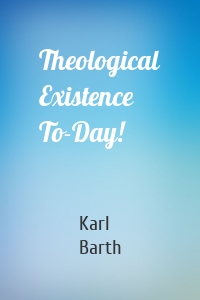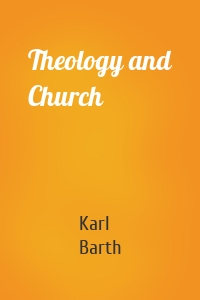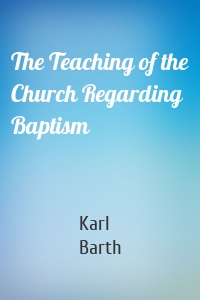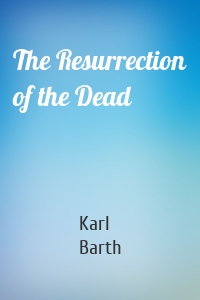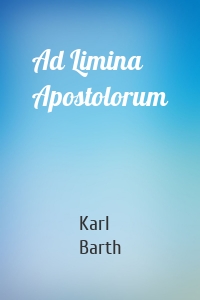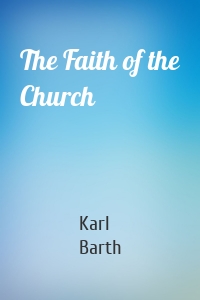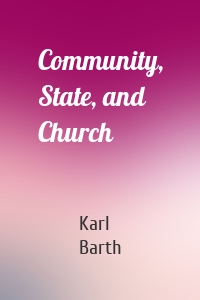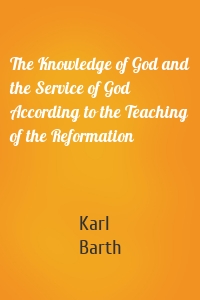Karl Barth
16 кн.
Final Testimonies
The five brief pieces collected here represent the final words prepared by Karl Barth for publication, all of them originating during the period from his serious illness in August of 1968 to his death in December of that same year. The final selection is a fragment left unfinished the night he died. The last word that I have to say as a theologian or politician is not a concept like grace but a name: Jesus Christ. He is grace and he is the ultimate one beyond world and church and even...
| Автор | Karl Barth |
Witness to the Word
Karl Barth's lectures on the first chapter of the Gospel of John, delivered at Muenster in 1925-26 and at Bonn in 1933, came at an important time in his life, when he was turning his attention more fully to dogmatics. Theological interpretation was thus his primary concern, especially the relation between revelation and the witness to revelation, which helped to shape his formulation of the role of the written (and spoken) word vis-a-vis the incarnate Word. The text is divided into three...
| Автор | Karl Barth |
Credo
This important book, by a theologian regarded as the most eminent of this century, explains the Apostle's Creed as a foundation of the Christian religion.
| Автор | Karl Barth |
Wolfgang Amadeus Mozart
No description available.
| Автор | Karl Barth |
The Resurrection of the Dead
Karl Barth saw Chapter 15 as the center of 1st Corinthians, arguing that a misunderstanding of the resurrection underlies all the problems in Corinth. In this volume, he develops his view of biblical eschatology, asserting that Chapter 15 is key to understanding the testimony of the New Testament. Barth understood the last things not as an end to history but as an end-history with which any period is faced. "He only speaks of last things who would speak of the end of all things, of their...
| Автор | Karl Barth |
God In Action
In this series of lectures delivered in the period immediately preceding World War II, Barth addresses the major topics of systematic theology. The reader gets a glimpse of the depth of Barth's thinking in these brief discourses, which he expanded upon greatly in his major work, 'Church Dogmatics.' In an Appendix, Barth answers question from the audience regarding the last essay. Contents 1. Revelation 2. The Church 3. Theology 4. The Ministry of the Word 5. The Christian...
| Автор | Karl Barth |
The Faith of the Church
The Apostles' Creed is the foundation of Christian faith. The interpretive version of the Apostles' Creed formulated by the Swiss reformer John Calvin in his Catechism has been the basis of Protestant theological education for centuries. In The Faith of the Church, Karl Barth, one of the powerful and enduring theologians of modern Protestantism, reinterprets the Apostles' Creed according to the Catechism of Calvin. The theology of Karl Barth has been one of the mobilizing...
| Автор | Karl Barth |
Ethics
Originally published in German in an edition edited by Dietrich Braun, Karl Barth's Ethics is at last available in English. This volume, containing lectures given as courses at the University at Munster in 1928 and 1929, represents Barth's first systematic attempt at a theological account of Christian ethics. Although composed over fifty years ago, just prior to Barth's thirty-year devotion to Church Dogmatics, many of its themes, problems, and conclusions are astonishingly...
| Автор | Karl Barth |
Christ and Adam
In this essay, Barth discusses the relationship between Christ and Adam as understood by Paul. Moving beyond traditional exegetical and theological scholarship done on Romans 5, Barth offers an entirely new interpretation of the conception of humanity presented in Paul's view of the Christ-Adam relationship. A valid contribution to the interpretation of Romans 5, 'Christ and Adam' is also an example of Barth's exegetical method and provides insight into his broader...
| Автор | Karl Barth |
Community, State, and Church
Karl Barth was the master theologian of our age. Whenever men in the past generation have reflected deeply on the ultimate problems of life and faith, they have done so in a way that bears the mark of the intellectual revolution let loose by this Swiss thinker. But his life was not simply one of quiet reflection and scholarship. He was obliged to do his thinking and writing in one of the stormiest periods of history, and he always attempted to speak to the problems and concerns of the time....
| Автор | Karl Barth |
The Knowledge of God and the Servic...
These lectures on that teaching [of the Reformed church on natural theology] will not take the form of an independent outline, but will be connected with a 'document' of the Reformation. Further, taking into account the specifically Scottish character of the Gifford foundation, this document will be a document of the 'Scottish' Reformation. . . . I am letting John Knox and his friend speak in their 'Confessio Scotica' of 1560. This is not to take the form of an...
| Автор | Karl Barth |



